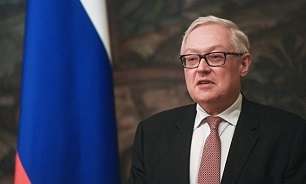Russia Makes No Changes to Military Doctrine over US Plans to Quit INF Treaty
 "Russia’s military doctrine envisages two purely hypothetical scenarios under which the country may use nuclear weapons. Firstly, an attack against Russia with nuclear weapons or other weapons of mass destruction," he stated, TASS reported.
"Russia’s military doctrine envisages two purely hypothetical scenarios under which the country may use nuclear weapons. Firstly, an attack against Russia with nuclear weapons or other weapons of mass destruction," he stated, TASS reported.
"Secondly, an act of aggression against Russia with conventional weapons on such a scale that may endanger the very existence of our statehood," he added.
"Clearly, both scenarios are purely hypothetical, and no changes to the Russian military doctrine are to be made," Ryabkov said, adding that "but of course there will follow a discussion of alternative scenarios, a discussion of conceptual kind of how this or that change in the situation in Europe or any other region may be reflected in the doctrine".
He described that as one of the negative effects of the United States’ declared intention to pull out from the INF Treaty.
"That this intention disrupts strategic stability is seen in the fact specialists begin to raise questions whether it should be preserved and if some changes are required," Ryabkov stressed, noting that "general uncertainty soars".
Russia, Ryabkov said, cannot but react to a considerable change in the military and political situation "if the declared intention to quit the INF Treaty entails specific material steps".
"What our response will be, how we will balance the system again and ensure our security in this situation is a separate question. At this point the issue can be discussed only in very general terms," he added.
"Specialists responsible for military planning and analysis of the military and technical effects of this or that step will do that far more competently and at the right moment. The moment has not come yet," Ryabkov stated.
Moscow continues to maintain dialogue with Washington on the implementation of the Intermediate-Range Nuclear Forces Treaty (INF Treaty) and answered all questions posed by the American side, Ryabkov told reporters on Friday.
"We have continued dialogue with the US on the INF Treaty in specialized formats," he said, adding that "currently there is no reason to say that we have not answered some American questions [on the INF Treaty]. However, there is no specific schedule as to when, where and who answers questions, and what questions are answered".
Ryabkov added that, unlike Washington, Moscow was interested in keeping up the dialogue on the issue.
"The United States, accusing us of violating the treaty, draw the conclusion that it was no longer of any value to it. However, we, while putting forward much more substantial claims against Washington, do not do anything like that," he said, noting that "we continue to be confident that this treaty is of great value for European, global and our own security".
According to Ryabkov, Moscow has not yet received any formal notification on Washington’s withdrawal from the treaty.
"So far, all that we heard is just statements on the intention to take this step. Of course, there is an obvious difference between intentions and specific steps," he concluded.
US President Donald Trump on two occasions, on October 20 and 22, declared in public the intention to pull out from the INF Treaty. Moscow has not received an official notification yet, though. US presidential national security adviser John Bolton on October 31 said the notification would follow in due time.
The United States for the first time accused Russia of violating the INF in July 2014. Washington repeated its charges many times later on. Moscow emphatically denied them and came out with its own counterclaims over the United States’ non-compliance.
Message end/
